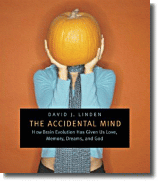About the book, from the publisher:
Among the praise for The Accidental Mind:
"[A] lively mix of solid science and fascinating case histories... The book's greatest strength is Linden's knack for demystifying biology and neuroscience with vivid similes (he calls the brain, weighing two percent of total body weight and using 20 percent of its energy, the Hummer H2 of the body). Though packed with textbook-ready data, the book grips readers like a masterful teacher; those with little science experience may be surprised to find themselves interested in -- and even chuckling over -- the migration of neurons along radial glia, and anxious to find out what happens next."
--Publishers Weekly (starred review)"More than another salvo in the battle over whether biological structures are the products of supernatural design or biological evolution (though Linden has no doubt it's the latter), research on our brain's primitive foundation is cracking such puzzles as why we cannot tickle ourselves, why we are driven to spin narratives even in our dreams and why reptilian traits persist in our gray matter."
--Sharon Begley, Newsweek"Linden tells his story well, in an engaging style, with plenty of erudition and a refreshing honesty about how much remains unknown. The book should easily hold the attention of readers with little background in biology and no prior knowledge of brains. It would make an excellent present for curious non-scientists and a good book for undergraduates who are just entering into the brain's magic menagerie. Even readers trained in neuroscience are likely to enjoy the many tidbits of rarely taught information -- on love, sex, gender, sleep and dreams -- that spice up Linden's main argument. The Accidental Mind stands out for being highly readable and clearly educational. No doubt, the human brain evolved along a constrained path and is, in some respects, designed imperfectly. Linden will send that message home... We still know too little about the brain's inner workings to judge how well it does its job. What we do know, and what The Accidental Mind helps us to realize, is that the human brain is not designed as many have imagined."
--Georg Striedter, Nature"The majority of this book is an enjoyable neurosciences primer for the general reader. Evolutionary and psychological perspectives provide occasional insights about the mind, but mostly the subject here is the organ capable of conjuring it into existence. Linden makes clear that the physical substrate of our mental phenomena -- the squidgy and haphazard mass of our brain -- is a gloriously evolved muddle."
--Druin Burch, Times Literary Supplement
David J. Linden, Ph.D., is a Professor in the Department of Neuroscience at the Johns Hopkins University School of Medicine. His laboratory has worked for many years on the cellular substrates of memory storage in the brain.
Visit The Accidental Mind website and read some free chapters from the book.
The Page 99 Test: The Accidental Mind.
--Marshal Zeringue






